This nutritious whole wheat bread recipe pays off with its delicately fluffy crumb and perfectly crispy-crunchy seeded crust. And it’s surprisingly easy to make!
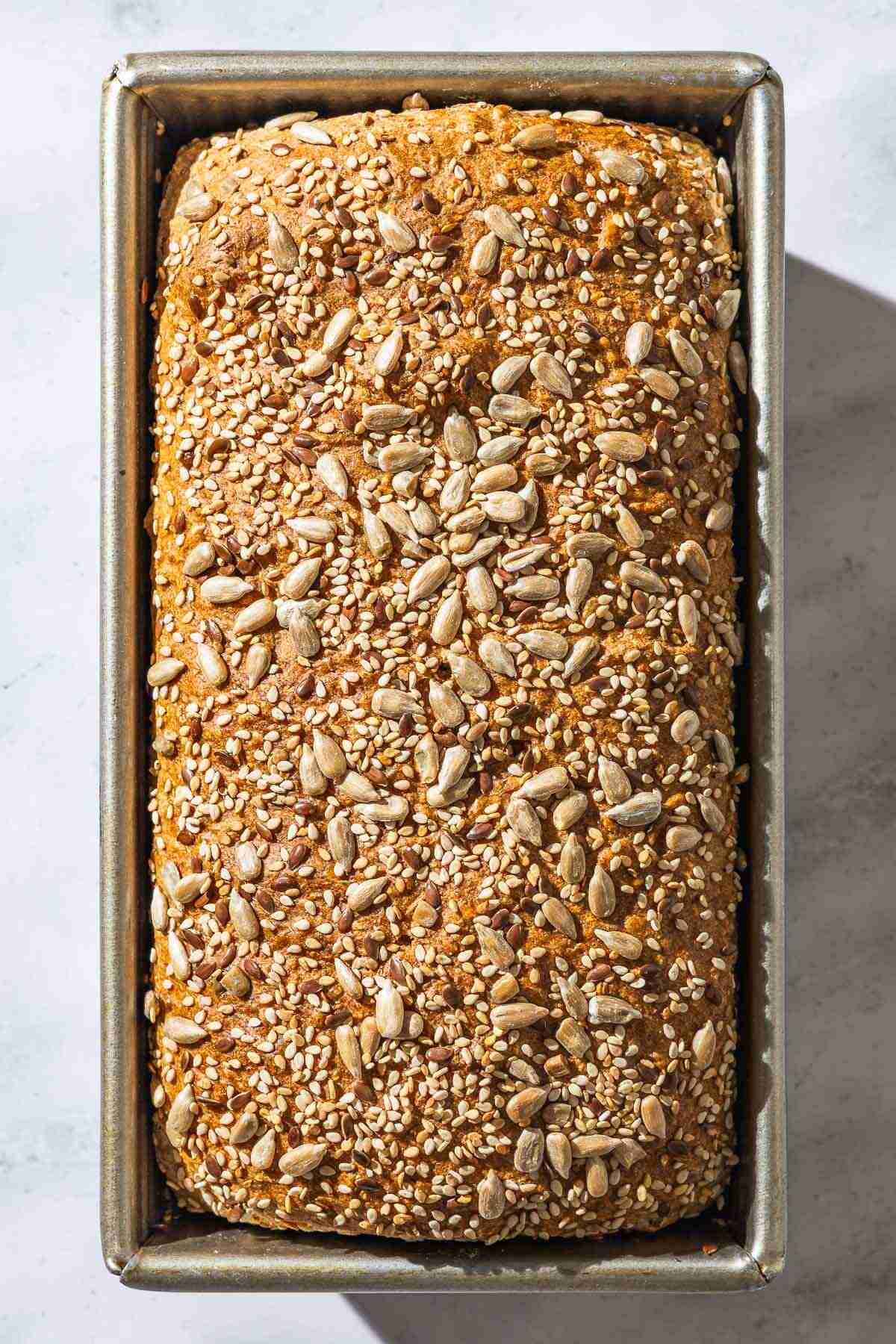
This wholesome and flavorful seeded whole wheat bread recipe is one of the many loaves I baked over the two years when I returned to New England after living in Spain. One of my first “culture shocks” was the supermarket sandwich loaves. They were so sweet, the crumb soft but disappointing, as was the crust. It took a long time to find store-bought artisan bread, and when I did they were surprisingly expensive.
Whenever I could manage, I’d make homemade bread. Dedicating ten minutes of meditative mixing and kneading, plus passive time waiting for the dough to rise and bake, turned into a delicious ritual. This simple whole wheat bread recipe was born, along with other whole wheat goodies like Pizzas Dough and Blueberry Muffins.
With this simple loaf, the whole wheat flour imparts a complex and earthy flavor, while the blend of toasted seeds adds a mild nuttiness. As opposed to supermarket varieties, homemade bread has a crisp crust to contrast the soft interior. The crunchy seeds add to the textural variety, and you can control the sweetness with just a tablespoon of honey.
Making your own sandwich bread doesn’t require as much time as you might expect, especially when you consider it’s mostly hands-off. Storebought bread doesn’t get stale as quickly as homemade bread–almost frighteningly so—but you will get a few days out of this one. Plus, it comes back to life with a quick trip to the toaster, ready for Breakfast Toasts or open-faced sandwiches.
Table of Contents
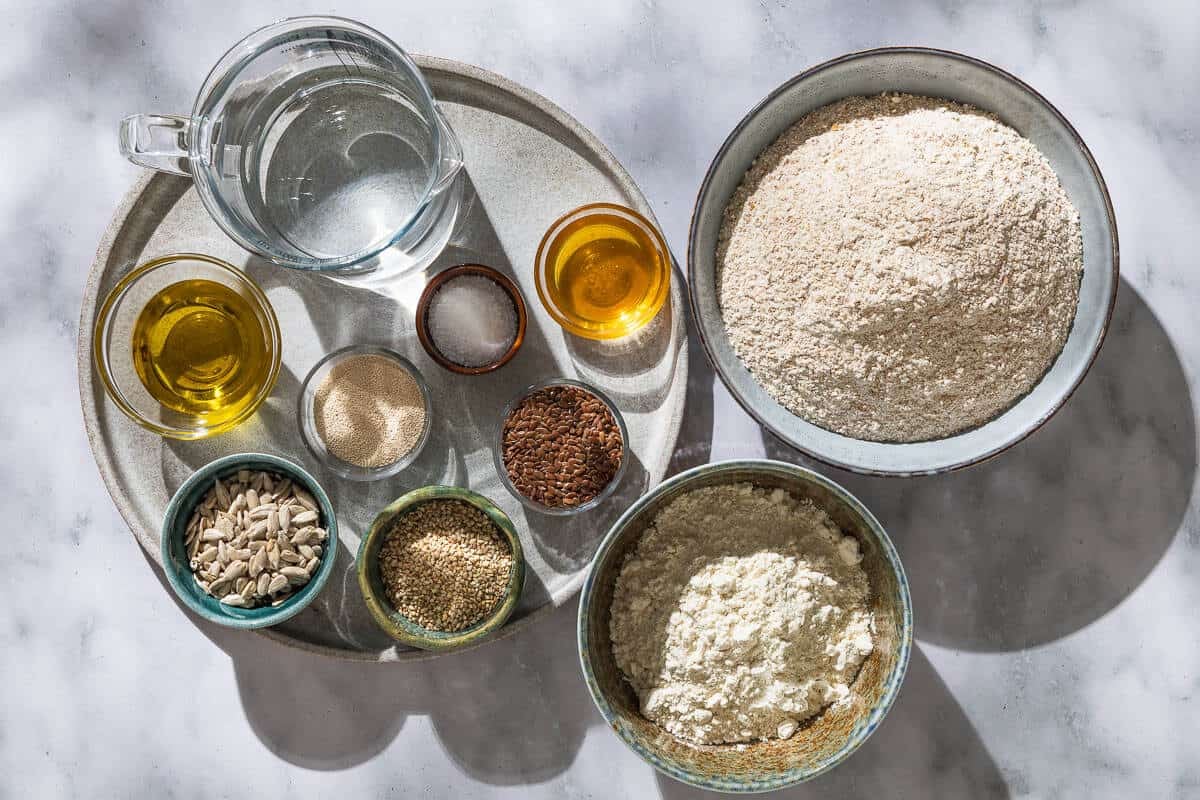
Seeded Whole Wheat Bread Ingredients and Substitutions
This simple list of ingredients bakes into a nutty, wholesome sandwich bread, and it can easily be made vegan. This bread is a great way to use up partial bags of seeds in your cupboard, or you can use a blend of your favorites. Here’s what you’ll need:
- Whole wheat flour: Nutty and earthy, whole wheat flour is not only healthier but much more flavorful than white flour. You can use regular whole wheat flour or white whole wheat flour for a lighter taste.
- All-purpose flour: Using some all-purpose flour makes the bread loftier, softer, and lightens the crumb. You can use 100% whole wheat, but the loaf will not rise as much.
- Mixed seeds: Seeds add flavor, texture, extra protein, and a dose of healthy fats. I used a blend of flax, sunflower, and sesame sesame seeds.
- Kosher salt: I use Diamond Crystal kosher salt. If you’re using Morton’s, sea salt or table salt, reduce the amount to 1 1/2 teaspoons.
- Instant yeast: I like to use instant yeast because you don’t need to activate it before mixing the dough. You may substitute it with the same amount of active dry yeast, but you’ll need to extend the rising and proof times by 15 to 20 minutes.
- Water: You can substitute some or all of the water for milk or plant-based milk for a richer loaf.
- Olive oil: Olive oil tenderizes the dough and gives the loaf a softer crumb.
- Honey: A little bit of honey adds a touch of floral sweetness to offset some of the bitter notes in the whole wheat. To make this vegan, substitute the honey with another liquid sweetener, such as maple, date, or agave syrup.
- Egg wash: brushing the top of the loaf with an egg wash helps the mixed seed topping stick to the bread and creates a golden-brown crust. To make it vegan, use Just Egg (vegan egg replacement) thinned with some plant-based milk, or to use aquafaba.
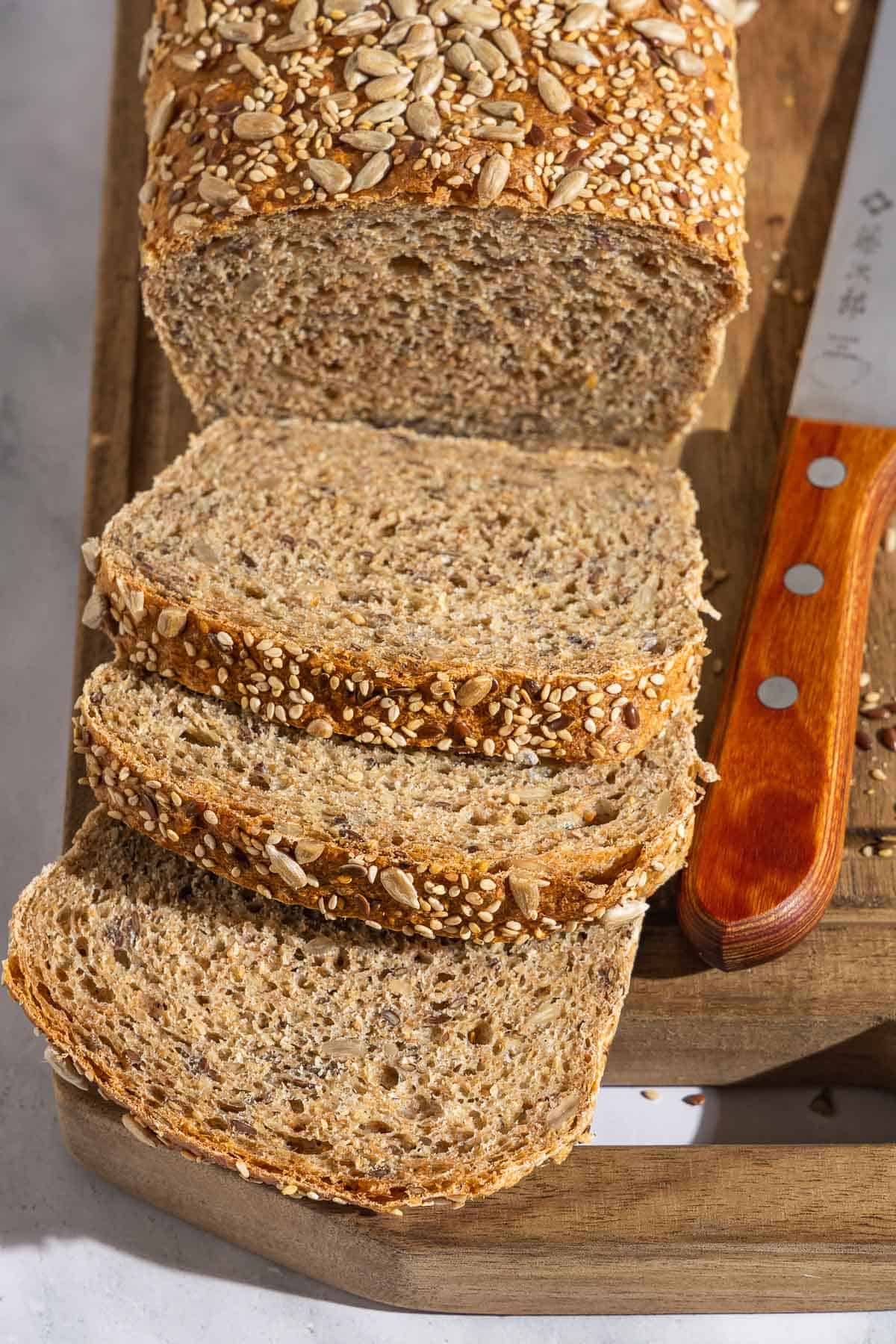
How to Make Seeded Whole Wheat Bread
At one point I fell into a rhythm of baking bread on Sunday afternoons to use throughout the week. I’m not suggesting everyone has the time for this—I admit baking is both my job and my hobby. But it can be a treat to break the routine when you can, especially when the reward is freshly baked bread! Here are the steps:
Make and Rest the Dough
- Toast the seeds: Preheat the oven to 350°F. Spread 1/2 cup of mixed seeds into a single layer on a baking sheet and toast in the preheated oven for 5 to 10 minutes, until fragrant and light brown. Start checking after 5 minutes so they don’t burn. Turn off the oven and set the seeds aside to cool slightly.
- Mix the dry ingredients: Add the cooled seeds to a large mixing bowl, along with 2 3/4 cups (330g) whole wheat flour, 1 cup (120g) all-purpose flour, 1 tablespoon (9g) salt, and 1 tablespoon instant yeast.
- Add the wet ingredients: Pour in 1 1/4 cups (300ml) hot water (105 to 115°F), 2 tablespoons olive oil, and 1 tablespoon honey. Mix with a wooden spoon until the dough comes together into a rough ball.
- Knead the dough: Scrape the dough onto a lightly floured surface. Knead by hand for 10 minutes until smooth. At first, the dough will seem too sticky, but it will become more manageable as you knead it. Try not to add much flour. If the dough sticks to your hands or the countertop, let it be and reincorporate it into the dough once the dough loses some of its stickiness.
- First rise: Shape the dough into a taught ball. Grease a clean bowl with a thin layer of olive oil and place the ball of dough in the bowl.
- Rest the dough. Cover and leave it in a warm place to rise for about 1 hour, or until roughly doubled in size.
Shape, Top, and Proof the Dough
- Shape the dough: Grease a loaf pan with olive oil and set aside. Lightly dust a clean work surface with flour. Place the dough upside down on the surface so the smooth side is facing down. Gently press and stretch the dough to shape it into a square the same width as the bottom of the loaf pan.
- Roll the dough into a log and pinch the seam. Place the loaf in the greased pan with the seam side down.
- Add the mixed seed topping: Make an egg wash by beating the egg and 1 tablespoon of water in a small bowl with a fork. Brush the top of the loaf lightly with the egg wash. Sprinkle the top with 1/4 cup of untoasted mixed seeds.
- Proof: Cover the pan loosely. Leave it in a warm place to rise for 30 minutes to an hour. The dough should reach the rim of a 9×5-inch loaf pan or about 1-inch above the rim in an 8 1/4×4 1/2-inch pan. Meanwhile, preheat the oven to 350°F.
Bake, Cool, and Slice
- Preheat the oven and bake: Bake the loaf in the hot oven until it’s golden brown, 50 to 60 minutes. If you have a digital thermometer, the loaf is done when the interior reaches 190°F.
- Cool: Remove the loaf from the pan and set it on a rack to cool. As tempting as warm bread is, for the best texture, let it cool completely before slicing.
What Seeds to Use for Whole Wheat Bread
I typically use a blend of flax, sunflower, and white sesame seeds in my whole wheat bread recipe because of their flavor, and because I always keep them stocked for adding to my weekly batch of Granola.
By switching what seeds you use, you can vary the flavor and texture of the loaf and adapt the recipe to what you keep stocked in your cupboard. You can try black sesame, pumpkin, chia, poppy, or hemp seeds. I toast the seeds that will be mixed into the dough, but I use untoasted seeds for topping the bread since they’ll toast while the bread bakes.
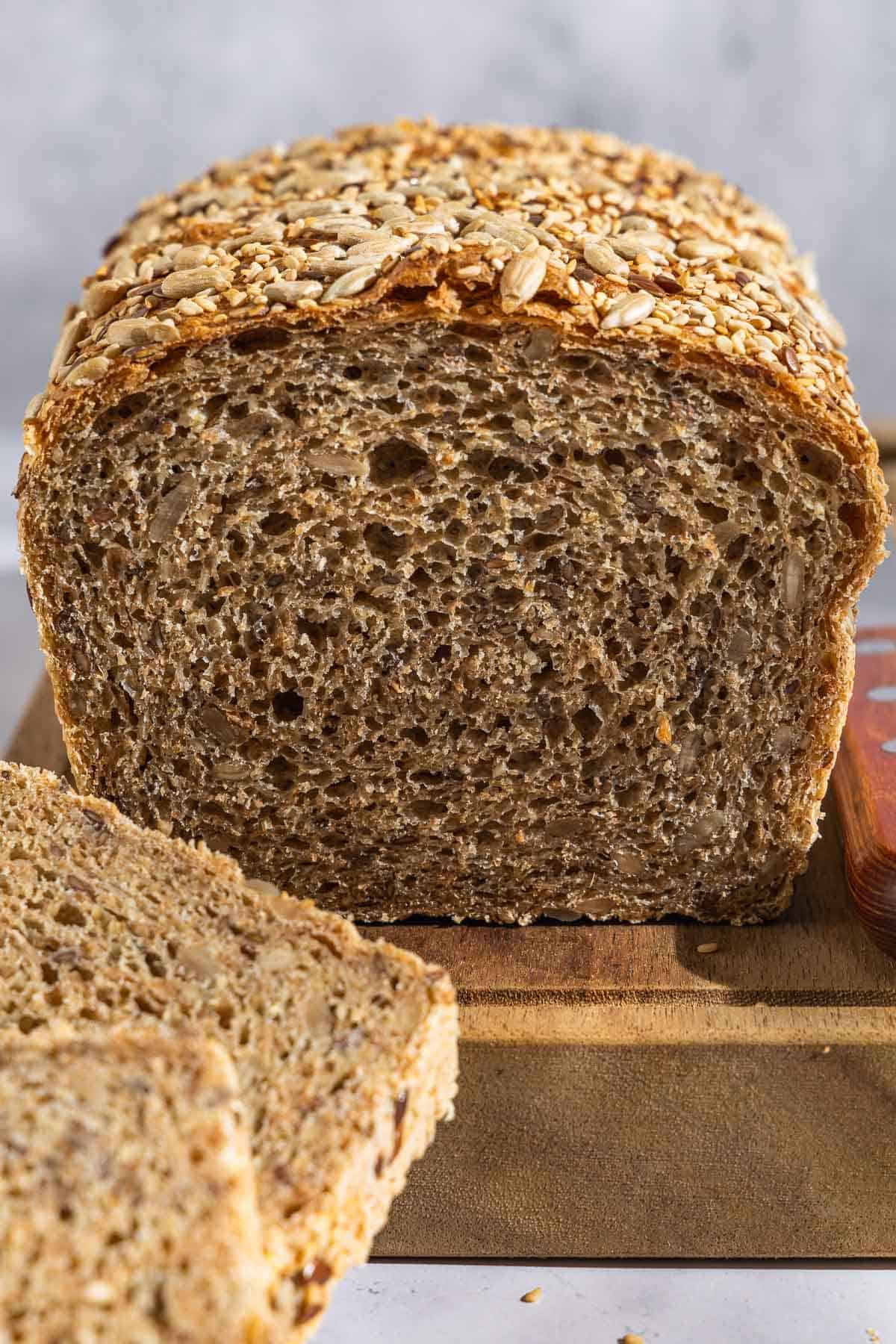
How to Knead Whole Wheat Dough
Kneading the dough develops the gluten, a network of proteins that activates when mixing flour and water. Gluten gives the dough structure and the ability to trap the gasses produced by the yeast for a well-risen, light loaf.
Lately, I’ve been kneading more doughs by hand, either on the countertop with doughs like this one or in the bowl using periodic folds for slacker doughs like Focaccia. I like to feel the dough transform from a sticky mess to a smooth, structured mass.
The dough is ready when it has lost its stickiness, though it may still feel tacky. The dough will stretch easily without tearing. It will look smooth, but not perfectly so because of the seeds and the bran from the whole wheat flour.
To knead by hand:
- Turn the dough out onto a lightly floured surface.
- Push the dough with the heel of your palm, stretching the dough forward.
- Use your fingers to fold it back.
- Give the dough a quarter turn and continue.
To knead in a stand mixer:
- Knead the dough on speed 2 in a KitchenAid fitted with a dough hook for 5 to 7 minutes, or until the dough no longer sticks to the sides of the bowl and gathers around the dough hook.
- Note: There’s less mess and you avoid the dough sticking to your hand. The only downside is that it may crush some of the seeds, but you won’t notice it in the final loaf.
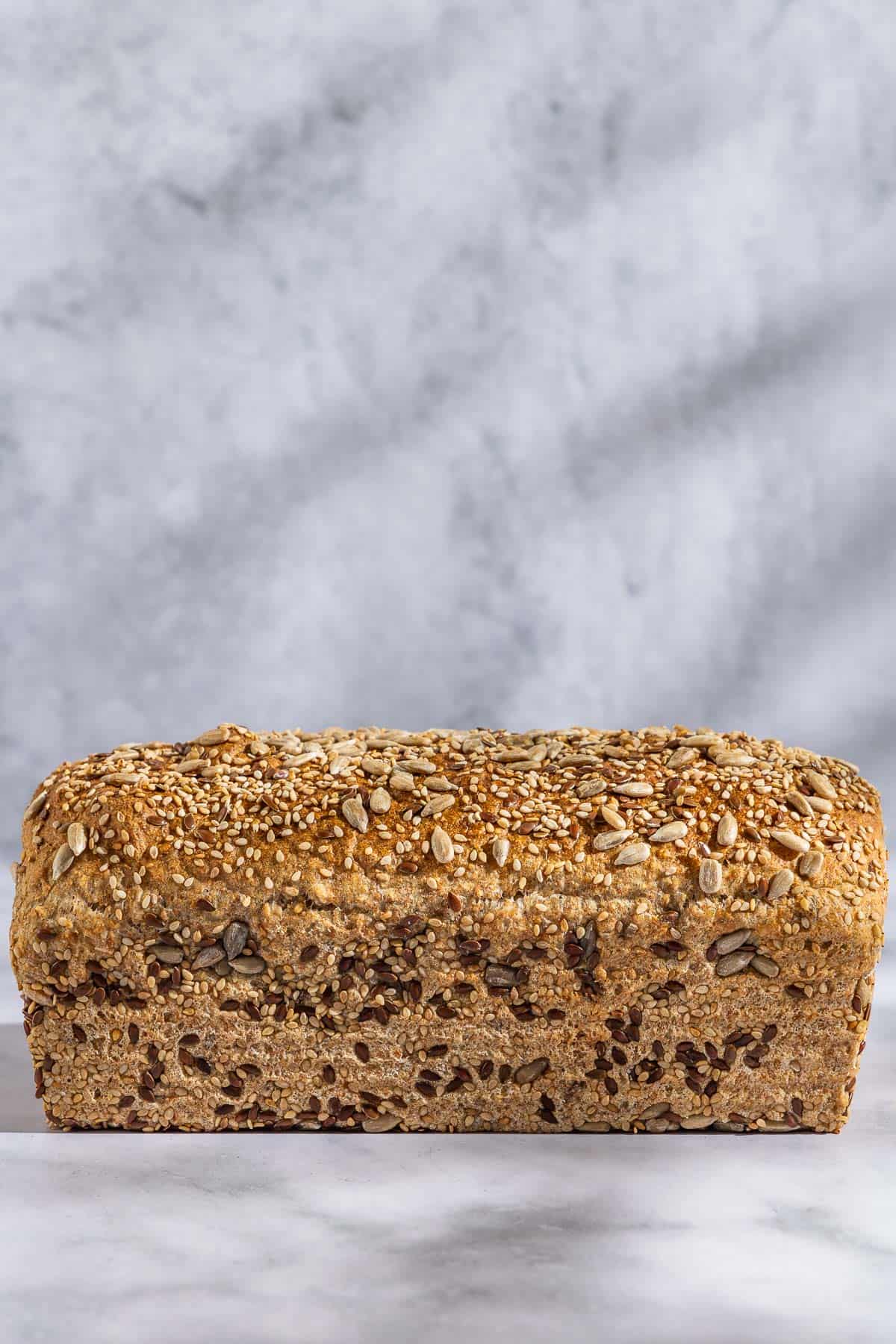
What to Serve with Seeded Whole Wheat Bread
This seeded whole wheat bread recipe is perfect for all kinds of sandwiches, open-faced sandwiches, and toast. While it’s fresh and soft, use it for this Chickpea Salad Sandwich or this Veggie Sandwich. After a few days, the bread will begin to stale—but don’t fret. Toasting it breathes new life.
Start the day with a hearty breakfast toast, like this Mediterranean-style Breakfast Toast or Egg Toast with Veggies. For a quick lunch or light dinner make this Vegetarian Smashed Chickpea Toast. Or, for an easy snack, spread on homemade Pistachio Butter and a drizzle of honey.
More Whole Wheat Treats
Browse all Mediterranean Recipes
Visit Our Shop
Seeded Whole Wheat Bread
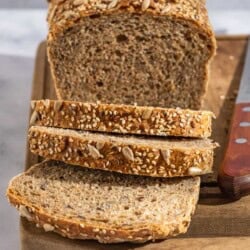
Ingredients
For the Dough
- 1/2 cup (70g) mixed seeds, such as flax, sunflower, and sesame
- 2 3/4 cups (330g) whole wheat flour
- 1 cup (120g) all purpose flour (see note)
- 1 tablespoon (9g) kosher salt
- 1 tablespoon instant yeast
- 1 1/4 cups (300ml) hot water (105 to 115°F)
- 2 tablespoons extra virgin olive oil, plus more for greasing
- 1 tablespoon honey
For the Topping
- 1 large egg
- 1 tablespoon water
- 1/4 cup (35g) mixed seeds, such as flax, sunflower, and sesame
Instructions
- Toast the seeds: Preheat the oven to 350°F. Spread the 1/2 cup mixed seeds into a single layer on a baking sheet and toast in the preheated oven for 5 to 10 minutes, until fragrant and light brown. Start checking after 5 minutes so they don't burn. Turn off the oven and set the seeds aside to cool slightly.
- Mix the dry ingredients: In a large mixing bowl, whisk together the whole wheat flour, all-purpose flour, toasted seeds (it's okay if they're still warm), salt, and yeast.
- Add the wet ingredients: Pour in the water, olive oil, and honey. Mix with a wooden spoon until the dough comes together into a rough ball.
- Knead the dough: Scrape the dough onto a lightly floured surface. Knead by hand for 10 minutes until smooth. At first, the dough will seem too sticky, but it will become more manageable as you knead it. Try not to add much flour. If the dough sticks to your hands or the countertop, let it be and reincorporate it into the dough once the dough loses some of its stickiness.
- First rise: Shape the dough into a taught ball. Grease a clean bowl with a thin layer of olive oil and place the ball of dough in the bowl. Cover and leave it in a warm place to rise for about 1 hour, or until roughly doubled in size.
- Shape the dough: Grease a loaf pan with olive oil and set aside. Lightly dust a clean work surface with flour. Place the dough upside down on the surface so the smooth side is facing down. Gently press and stretch the dough to shape it into a square the same width as the bottom of the loaf pan. Roll the dough into a log and pinch the seam. Place the loaf in the greased pan.
- Add the mixed seed topping: Make an egg wash by beating an egg and 1 tablespoon of water in a small bowl with a fork. Brush the top of the loaf lightly with the egg wash. Sprinkle the top with 1/4 cup of untoasted mixed seeds.
- Proof: Cover the pan loosely. Leave it in a warm place to rise for 30 minutes to an hour. The dough should reach the rim of a 9×5-inch loaf pan or about 1-inch above the rim in an 8 1/4×4 1/2-inch pan. Meanwhile, preheat the oven to 350°F.
- Preheat the oven and bake: Bake the loaf in the hot oven until it’s golden brown, 50 to 60 minutes. If you have a digital thermometer, the loaf is done when the interior reaches 190°F.
- Cool: Remove the loaf from the pan and set it on a rack to cool. As tempting as warm bread is, for the best texture, let it cool completely before slicing.
Video
Notes
- Shop this recipe: Visit our shop to browse quality Mediterranean ingredients including the olive oil and honey used in this recipe.
- Storage: Store the bread in an airtight container, a bread box, a cloth bag, or a paper bag for up to 3 days.
- To make it 100% whole wheat: Simply swap the all purpose flour for whole wheat flour, but keep in mind the loaf will not rise as much.
- To make it vegan:
- Swap the egg: My top recommendations would be to use Just Egg (vegan egg replacement) thinned with a splash of plant-based milk, or to use aquafaba.
- Swap the honey: With another liquid sweetener, such as maple, date, or agave syrup.
- To knead in a stand mixer: Knead the dough with a dough hook on speed 2 for 5 to 7 minutes, or until the dough no longer sticks to the sides of the bowl and gathers around the dough hook.
Nutrition
Bundle and Save!
Four of our best-selling signature olive oils, perfect for everyday use.

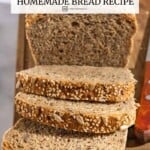
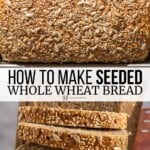
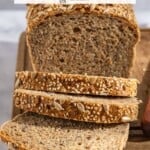
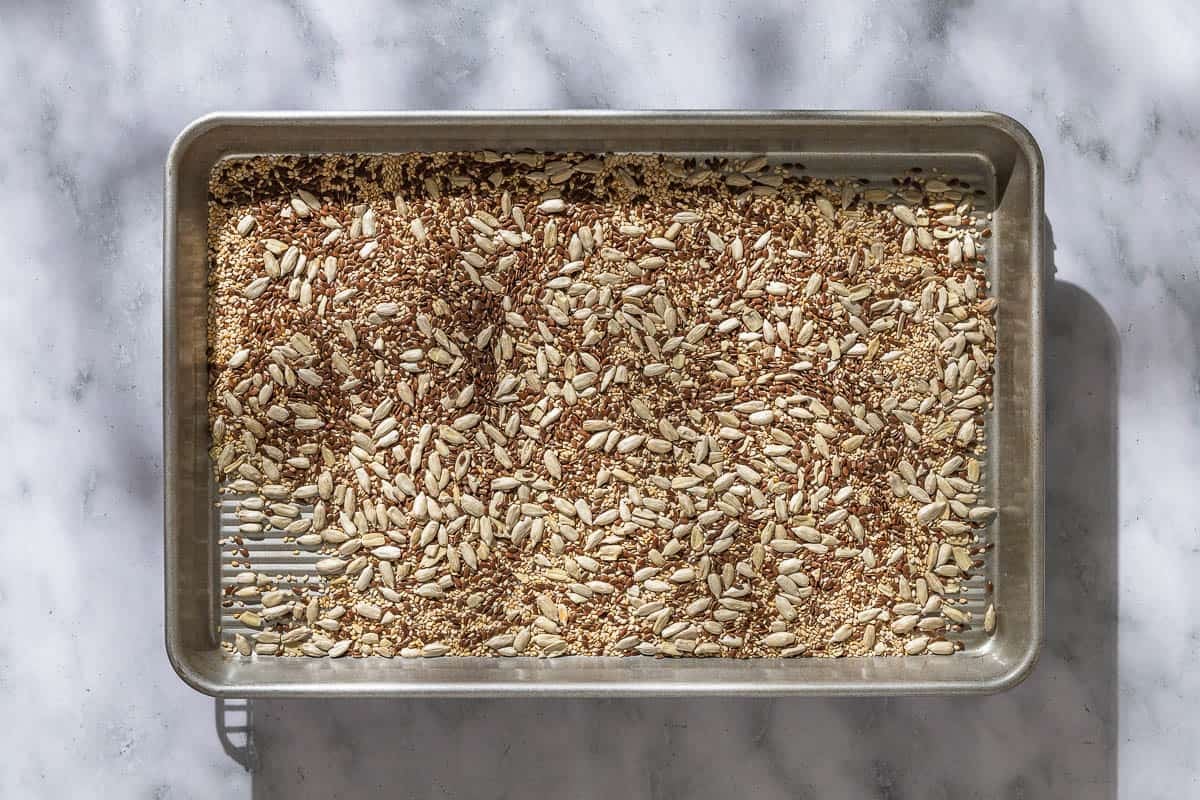
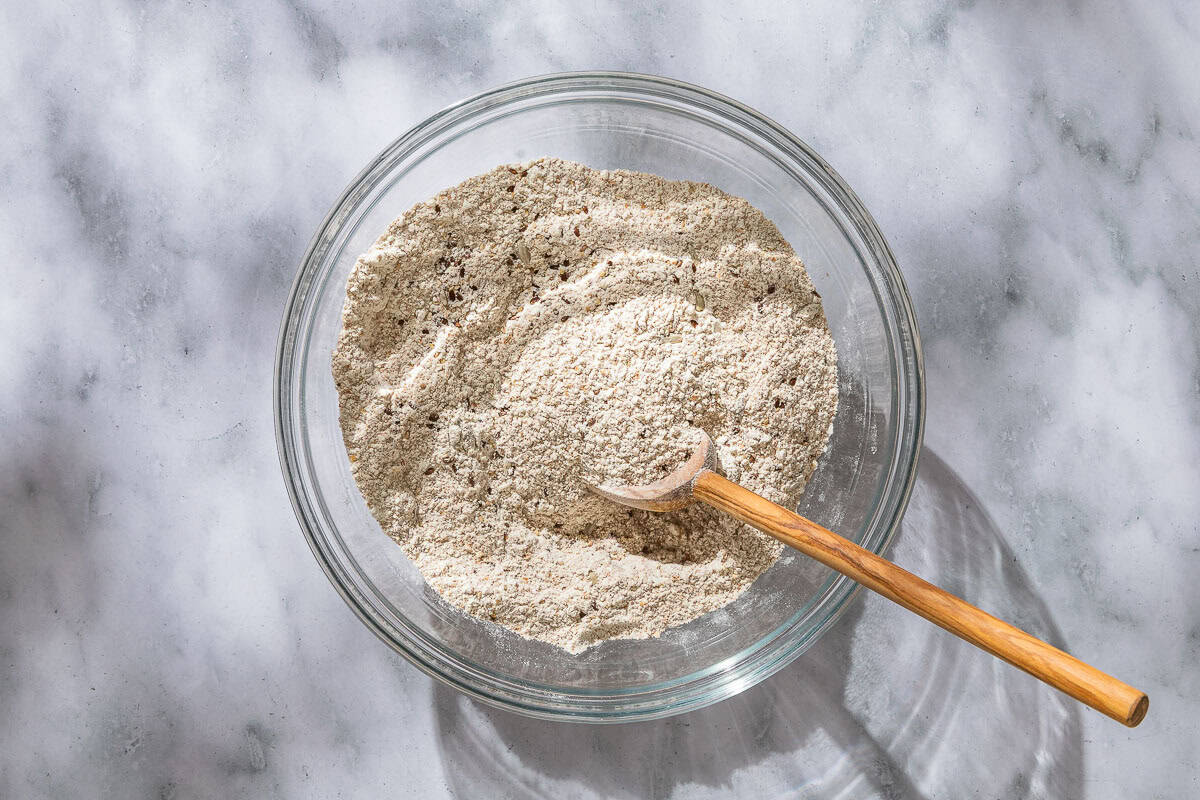
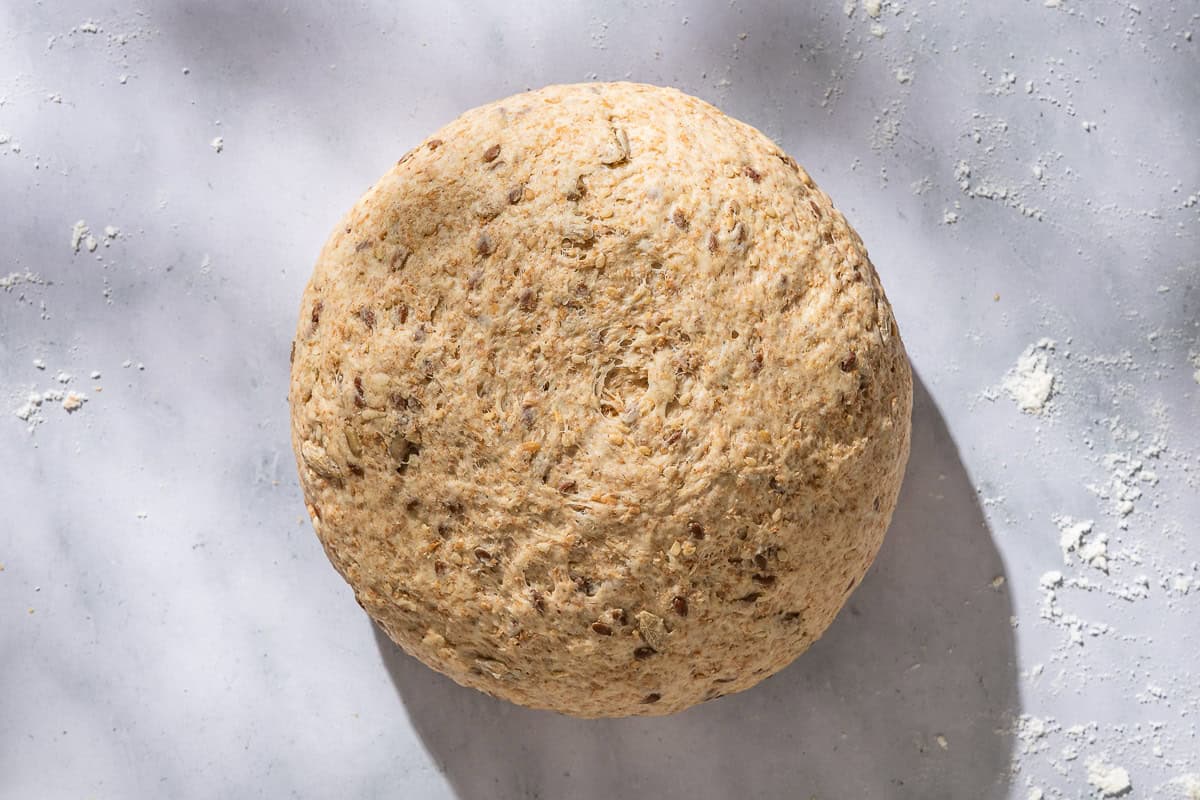
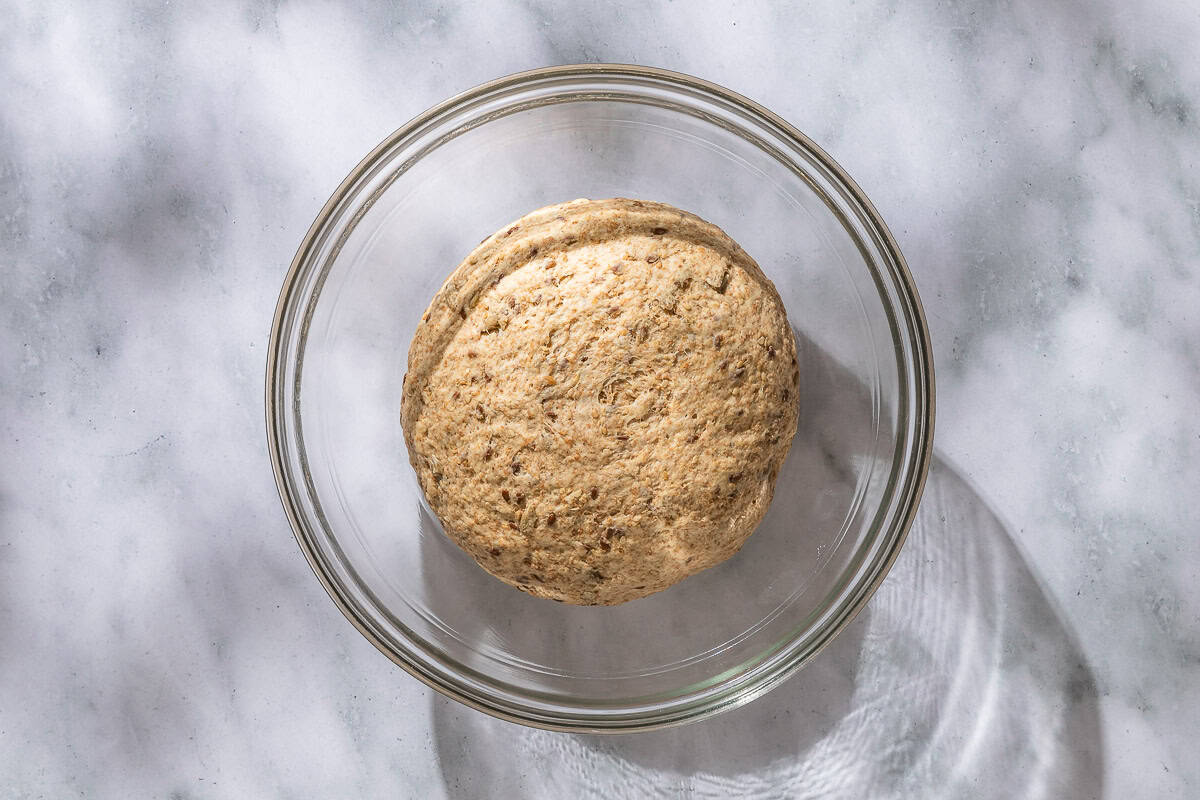
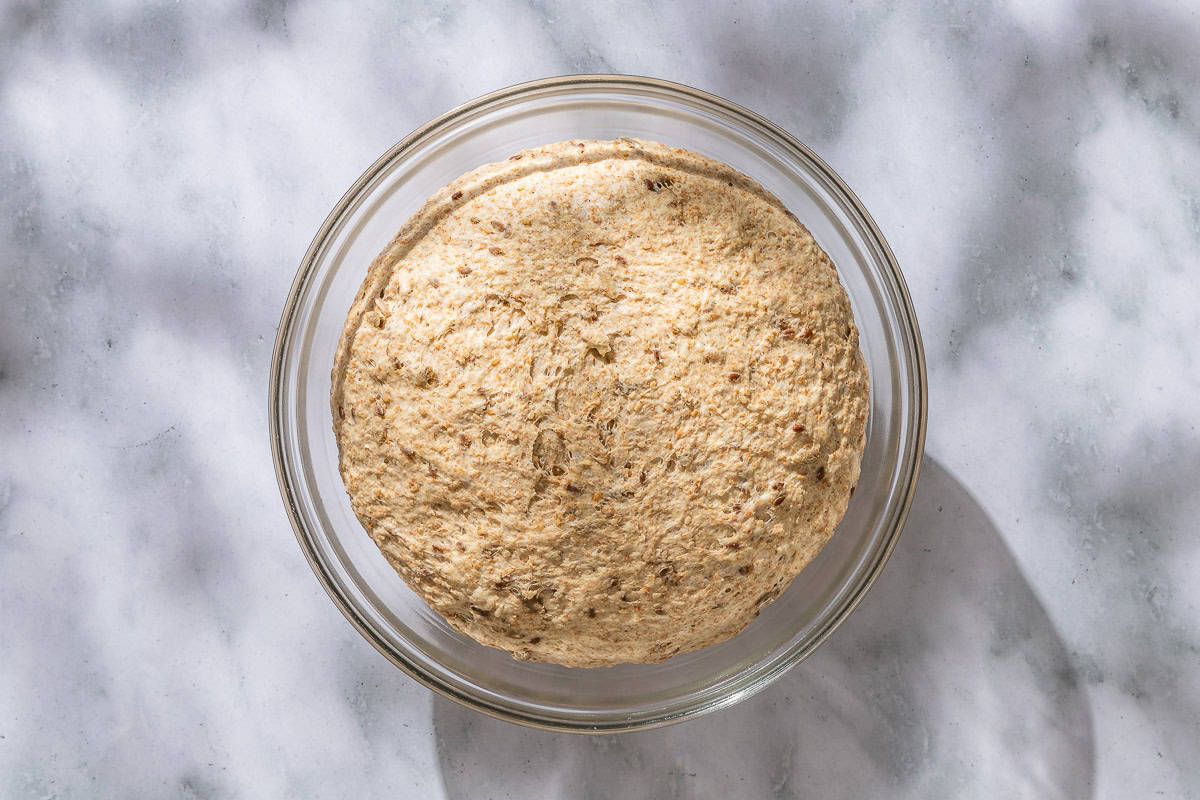
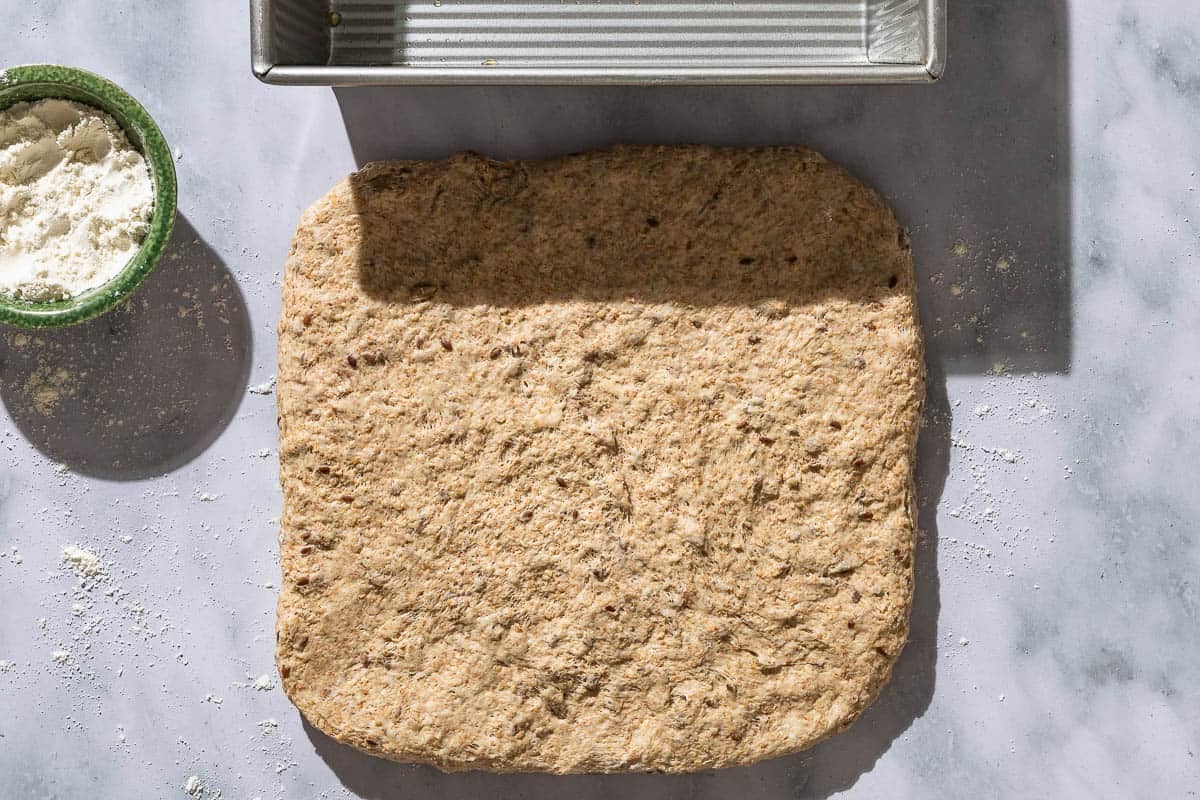
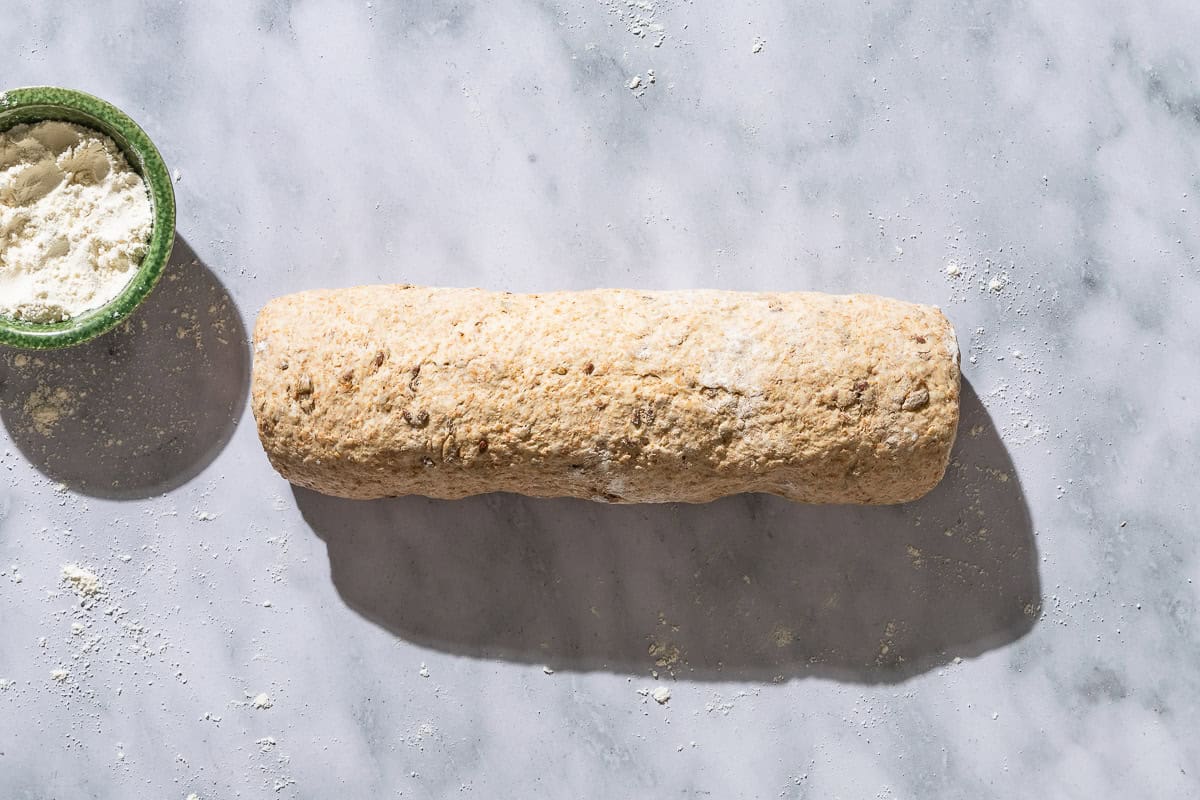
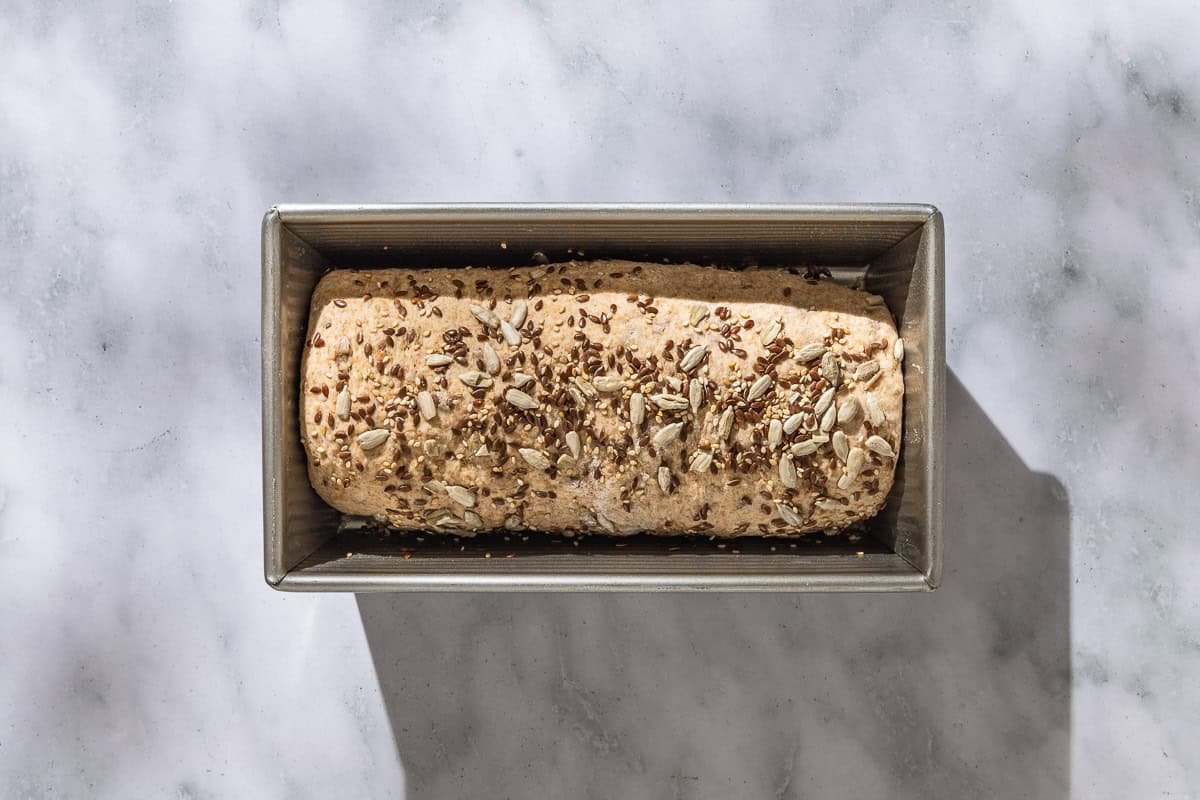
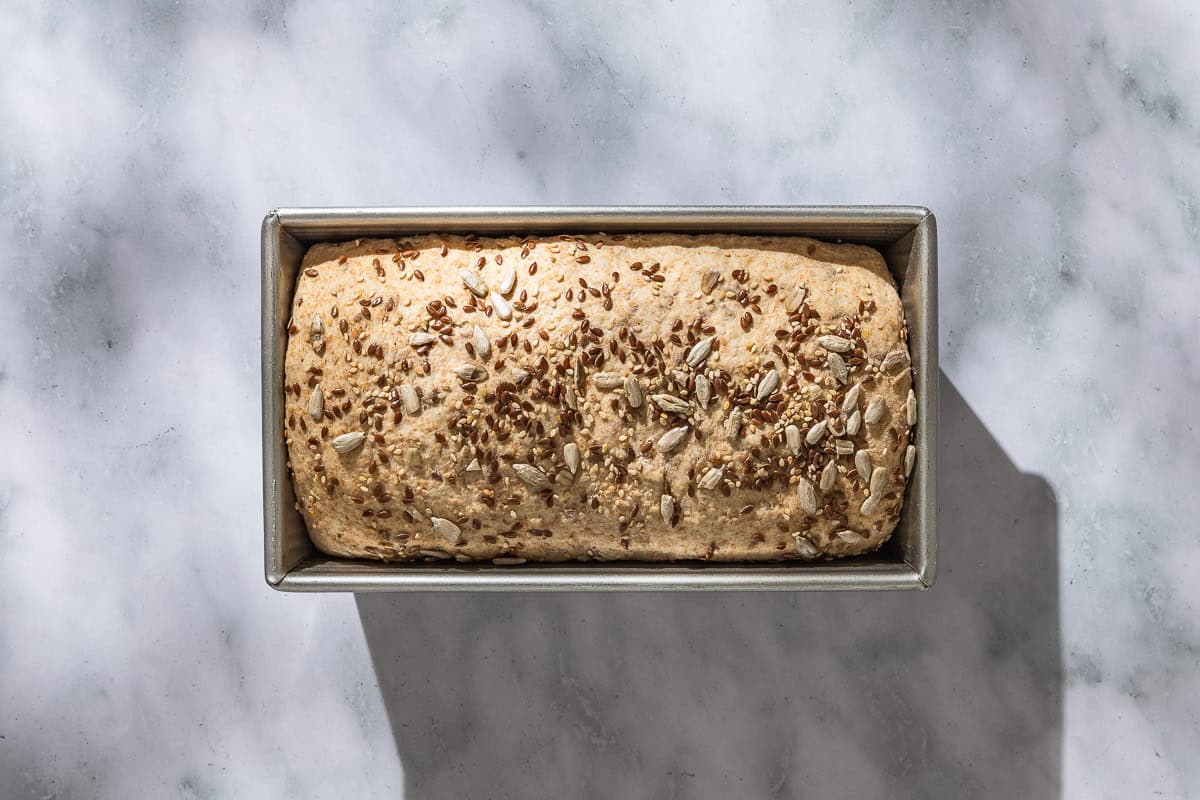
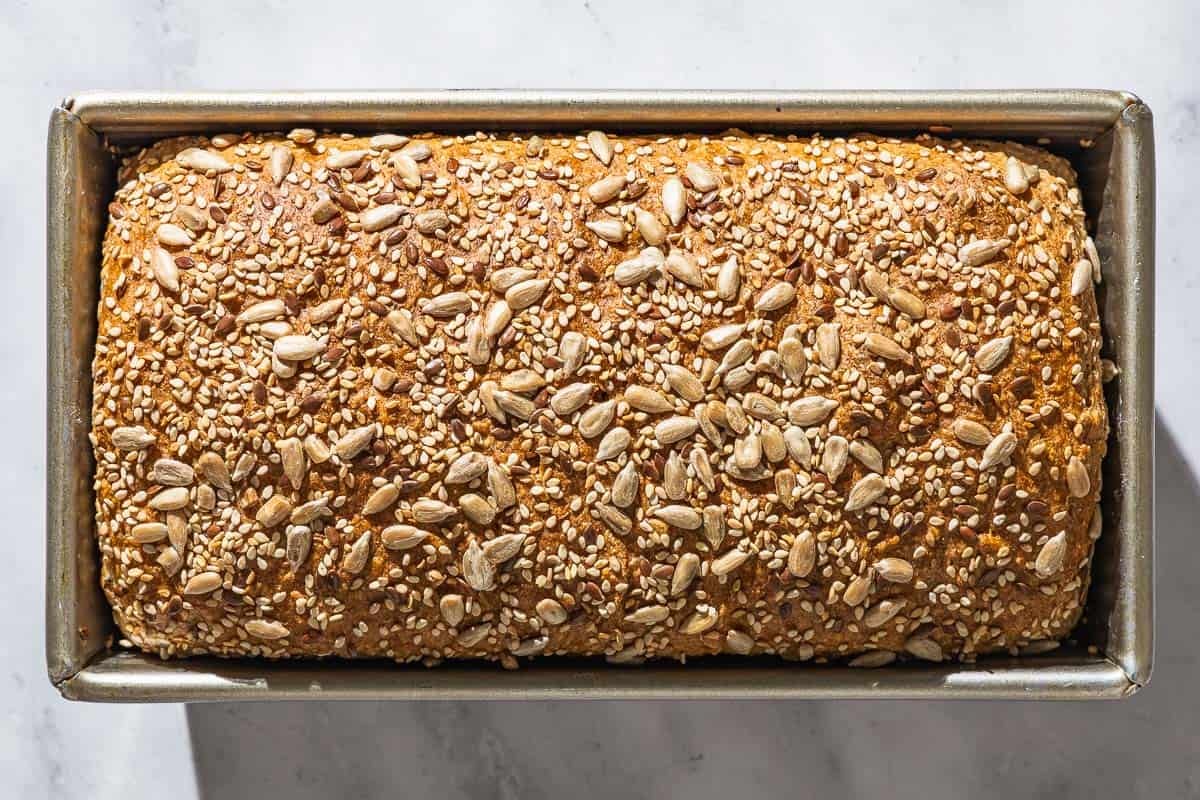
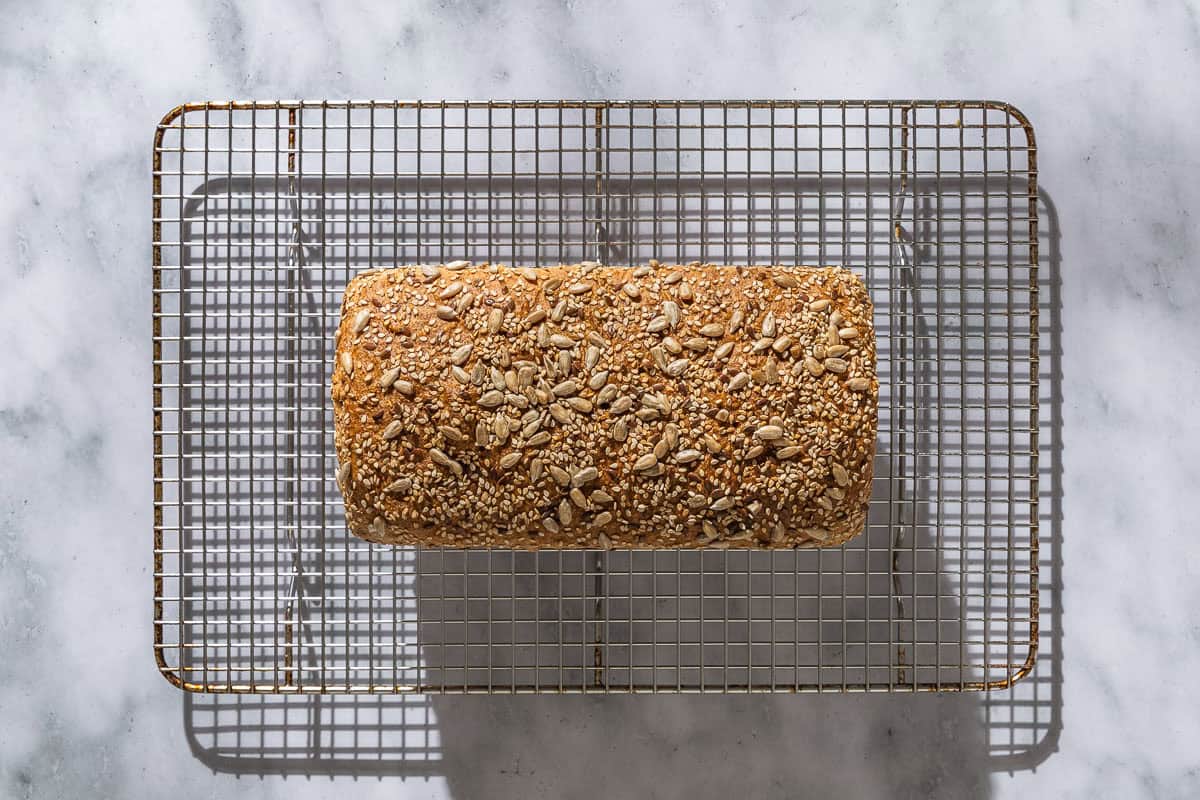

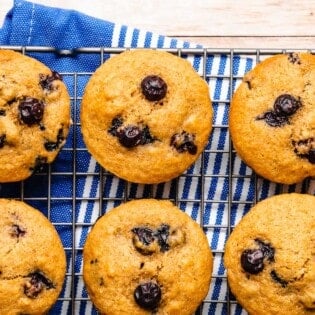
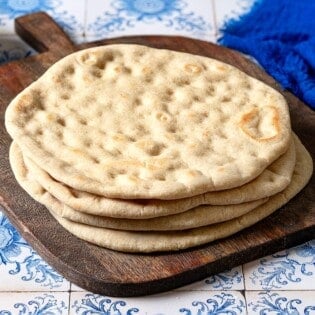
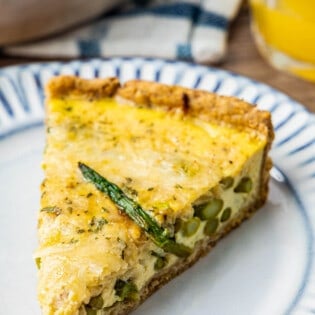
Delicious and recipe worked well for me
Do you think this could be shaped on a cookie sheet instead of baking in a bread pan? I think it would give it a rustic look.
This is an amazing recipe. I replaced 100g of the whole wheat flour with a dark rye flour. Everyone I have given this to is gobsmacked and my wholegrain-shy family has fallen in love with this bread. Thank you!
Awesome! Thanks so much for sharing, Mary!
Hello Mark,
is the nutritional information based on one slice of bread, and, if so, how many slices should this recipe yield?
Thank you!
Hello! Yes, the nutritional information here is per slice. This recipe yields approximately 12 slices.
For the seeded bread. Is the nutritional information per slice?
Hi, Gail! The nutritional info here is per slice.
This was wonderful. I did have a couple things that I intend to fix next time.
1) I used active yeast which by research said 1 active yeast = 3/4 instant. I did the conversion but later found in some notes that I should have used the same amounts. I did like that I could dissolve my honey in the warm water for the yeast first.
2) I was trained to tightly pack my flour. Tap with knife and scrape excess off. My dough was pretty dry, I added a bit more water, but after the first rise, when trying to stretch it out to roll, I did not need any flour and it was dry. Next time I will loosely pack the flour.
That being said, it turned out pretty good. Next time will be even better!
I’m glad it still worked and thanks for leaving a comment. Yes, for this recipe you want to loosely pack the flour. Happy Baking!
Weighing the flour is more accurate.
I felt the bread was wonderful for toast, grilled cheese sandwiches but too dry for sandwiches. The taste was great.